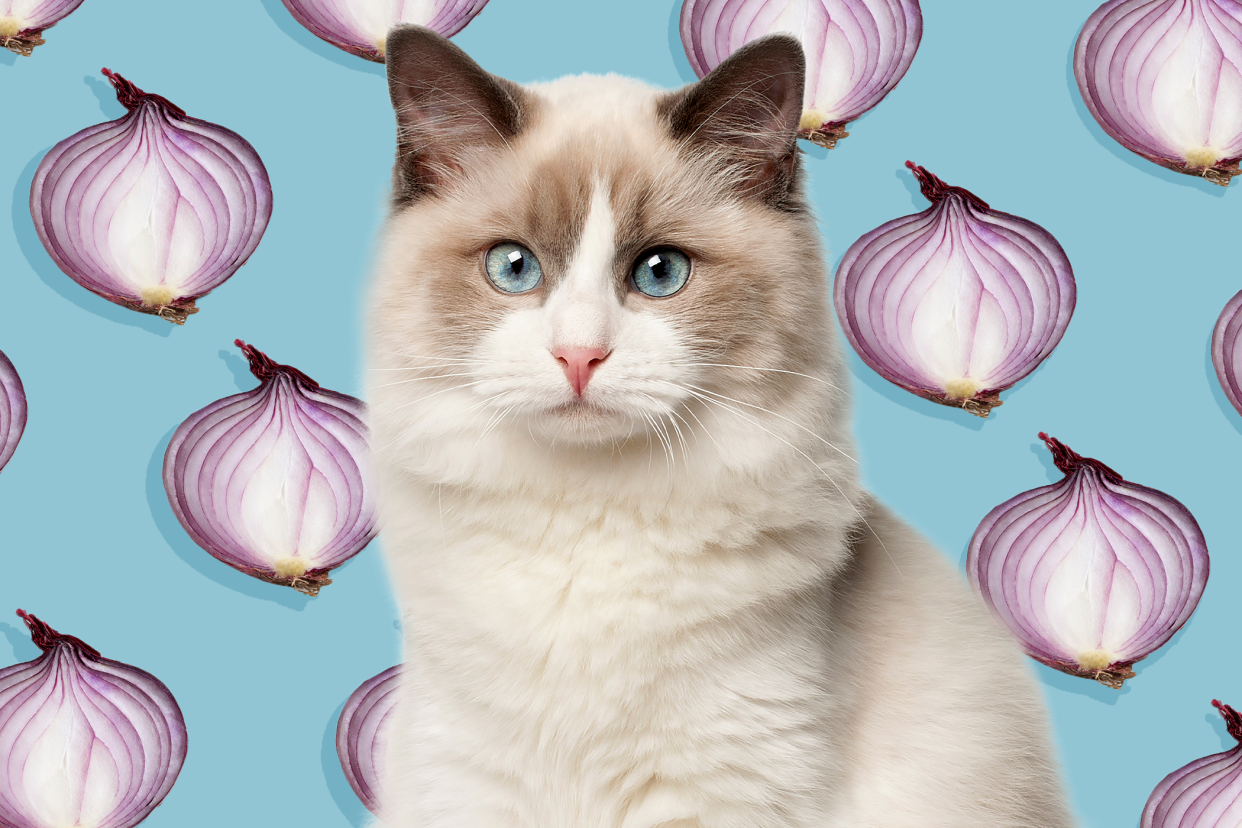Can Cats Eat Onions? No, Not At All—and Here's Why

Science Photo Library / Getty / Eric Isselée / Adobe Stock
Our curious cats frequently want a nibble of what we're eating, and sometimes those persuasive meows are hard to resist. But there are more than a few times when we need to encourage them to stop batting at what's on our plate and focus on their own meal, especially if certain human foods might be toxic to them.
As obligate carnivores, felines require animal protein for sustenance and survival. But what if they start nosing around your dish of chicken and sautéed onions? Can cats eat onions? Nope. Here's what you should know.
Are Onions Bad for Cats?
Definitely. "Even a small amount of onion can be all it takes to result in serious illness," Genna Mize, DVM and technical services veterinarian at Virbac, says. "Cats, more so than dogs, are particularly susceptible to the effects of onion toxicity with consumption due to the primary toxic principle, n-propyl disulfide." This property interferes with red blood cells transporting oxygen in the body, resulting in anemia.
Onions and other aromatics are in the Allium spp family, which includes hundreds of species. Mize adds that any Allium food items are all potentially toxic to your cat and should be avoided, including:
Chives
Leeks
Scallions (also known as green onions)
Shallots
Steer clear of powdered or freeze-dried onion spices, too. "Generally speaking, the more concentrated and flavorful the onion product (e.g. onion powder is more toxic on a gram-to-gram basis than fresh onion), the more toxic it is in small quantities," Mize says. So if you want to give your kitty a small bite of chicken as an occasional treat, make sure to cook the meat thoroughly without any seasoning at all, not even salt.
RELATED: 9 Human Foods That Are Safe for Kitty to Snack On
And while some Allium plants make quite an ornamental statement in your home or flower garden, swap them out for more pet-friendly plants that are safe for cats instead.
Onion Poisoning Symptoms in Cats
Unfortunately, it doesn't matter if your cat eats cooked onions, raw onions, or onion spices—he'll likely get sick. What's worse, Mize says, is that some symptoms might not show up right away. If your kitty consumes enough onion to cause medical problems, the first major symptom is gastrointestinal distress, such as vomiting and diarrhea. Others might not appear for up to five days later. That's a danger zone for your pet.
"This is when the body's compensatory mechanisms have been depleted and red blood cell changes have caused a level of anemia, resulting in illness," she adds.
Veterinarians caution that if vomiting is frequent and/or diarrhea lasts longer than two days, it's time for an exam. Other symptoms of onion poisoning include:
Red-to-brown colored urine
Pale gums
Yellowed skin
Increased breathing and heart rate
Weakness
Exercise intolerance
RELATED: What Every Pet Parent Needs to Know About Emergency Vet Services
What To Do If Your Cat Eats Onions
Mize says if you suspect your cat ate onions or notice any of the above warning signs, there's no home treatment. He needs to be evaluated by your vet ASAP.
"Unfortunately, there's no specific antidote to onion poisoning. If your cat has recently consumed (within approximately two hours) the food items, decontamination via inducing vomiting will likely be recommended," she says. "Your veterinarian will also want to perform blood work, including a CBC (complete blood cell count), organ function chemistry, and urinalysis to better understand your cat's illness."
The best way you can help is to give the most detailed history possible, including specific timelines surrounding your cat's consumption or possible exposure to toxins and a thorough report of unusual behaviors or signs you've seen at home.

